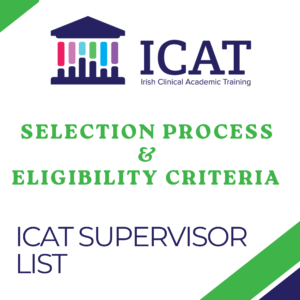Supervisor Database Search
Guidance for ICAT Supervisors
Supervisor Database
Full NameProfessor Grace Mulcahy
School of Veterinary Medicine
University College Dublin
Webpage:people.ucd.ie
Email hidden; Javascript is required.
- infectious disease and the immune system
- one health
- Veterinary Medicine
- Veterinary Epidemiology
- Veterinary Public Health
Our group works to understand the interaction between helminth parasites and the gut microbiota, and on how both of these input into the gastro-intestinal ecoystem in health and disease. We use next-gen sequencing approaches and muli-omics to develop novel diagnostic and therapeutic strategies for veterinary species, and use a One Health approach to understand the pathophysiology, across species, of diseases such as obesity, inflammatory bowel disease and chronic inflammation. In addition, we work to understand how parasitic helminths stimulate and regulate the host immune response. We also have science outreach and citizen science projects building on our One Health approach
https://www.ucd.ie/dogownermicrobiome/
https://www.ucd.ie/refohcus/
Some relevant publications:
Walshe, Nicola, et al. "A Multiomics Approach to Investigate the Effects of a Weight Loss Program on the Intestinal Health of Overweight Horses." Frontiers in veterinary science 8 (2021): 336.
Niedziela DA, Naranjo-Lucena A, Molina-Hernández V, et al. Timing of Transcriptomic Peripheral Blood Mononuclear Cell Responses of Sheep to Fasciola hepatica Infection Differs From Those of Cattle, Reflecting Different Disease Phenotypes. Front Immunol. 2021;12:729217. Published 2021 Sep 20. doi:10.3389/fimmu.2021.729217
Walshe N, Mulcahy G, Crispie F, et al. Outbreak of acute larval cyathostominosis - A "perfect storm" of inflammation and dysbiosis. Equine Vet J. 2021;53(4):727-739. doi:10.1111/evj.13350
Buffoni L, Garza-Cuartero L, Pérez-Caballero R, et al. Identification of protective peptides of Fasciola hepatica-derived cathepsin L1 (FhCL1) in vaccinated sheep by a linear B-cell epitope mapping approach. Parasit Vectors. 2020;13(1):390.
Our group would welcome students interested in projects in the following areas, which all involve collaborations between basic scientists and veterinary clinicians, and will allow candidates to develop skills in such areas as bio-informatics, molecular parasitology, one health, and parasite immunology
Characterisation of the gut microbiota response of obese and overweiight dogs to diet and exercise
Exploration of the similarity and differences between the gut microbiota of dogs and their owners (dog owner microbiome study)
Development of personalised diagnostics and therapeutics for equine gastro-intestinal diseases
Introduction of "nemabiome" approaches into the diagnostic parasitology laboratory and related applications
Understanding the equine immune response to cyathostomin infection

